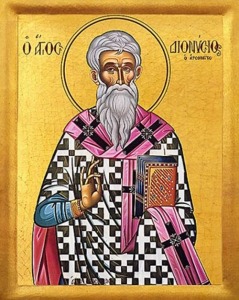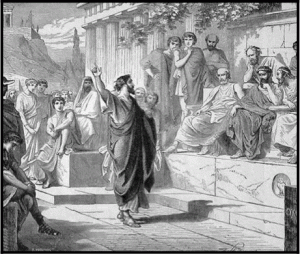THE GREAT apostle of the Gentiles, esteeming himself equally a debtor to the learned and to the unlearned, arrived at Athens about the year 51, seventeen years after our Lord’s crucifixion, and boldly preached the faith in that city, which had been for many ages the chief seat of the muses, where the chief studies of philosophy, oratory, and polite literature flourished.
All matters belonging to religion were, by an ancient law of that state, to be determined by the great council of the Areopagites, which was still observed; for, though the Athenians were fallen under the Roman yoke, yet, out of regard to their learning, and to the ancient dignity of their republic, the Romans restored to them many of their ancient privileges, with the name and title at least of their liberty.
St. Paul therefore was summoned to give an account of his doctrine in the Areopagus.* The apostle appeared undaunted in that august and severe assembly of proud sages, though Plato so much dreaded a like examination at this tribunal, that he on no other account dissembled his sentiments of the unity of God, and other like truths, of which he was himself perfectly satisfied, especially after his travels into Egypt, as St. Justin Martyr testifies.
St. Paul explained before these learned senators the Christian maxims of repentance, purity of manners, the unity and omnipresence of God, his judgments, and the resurrection of the dead. The divine unction with which he delivered these great truths was an eloquence with which these masters of philosophy and oratory were unacquainted.
The doctrine of the resurrection of the dead shocked many, and was a great stumbling-block, though Plato and other eminent philosophers among them had established many sublime sentiments with regard to the immortality of the soul, and the rewards and punishments of a life to come; but that our flesh, which putrefies in the earth, and perishes to all our senses, shall, by the power of God, be raised again the same that dies, was what many of these wise men of the world looked upon as a dream, rather than a certain truth. Many, however, among them were exceedingly moved with the sanctity and sublimity of this new doctrine, and with the marks of a divine mission with which the preacher delivered himself; and they said to him they would hear him again upon that subject on some other day.
Some whose hearts were touched by a powerful grace, and who with simplicity sought after the truth, not the idle gratification of curiosity, pride, or vanity, without delay addressed themselves to the apostle, and received from him full satisfaction of the evidence of the divine revelation which he preached to them.
Among these there was a woman named Damaris; but the most remarkable among these converts was Dionysius, one of the honourable members or judges of this most venerable and illustrious senate.
We are assured by the testimony of St. Dionysius of Corinth, that St. Dionysius the Areopagite was afterwards constituted bishop of Athens; and that this was done by St. Paul himself we are informed by the Apostolical Constitutions, by Aristides cited by Usuard, and by several ancient martyrologists.
Aristides, quoted by Usuard, and St. Sophronius of Jerusalem, styled him a martyr. The Greeks, in their menologies, tell us that he was burnt alive for the faith at Athens.
His name occurs in ancient calendars on the 3rd of October. The cathedral of Soissons is in possession of his head, which was brought thither from Constantinople, in 1205. Pope Innocent III. Sent to the abbey of St. Denis, near Paris, the body of this saint, which had been translated from Greece to Rome.
We admire in this glorious saint, and other illustrious primitive converts, the wonderful change which faith produced in their souls. It not only enlightened their understandings, discovering to them new fields of the most sublime and important knowledge, and opening to their meditation the boundless range of eternity, and of the infinite riches of the divine goodness, justice, and mercy; but it also exerted the most powerful influence upon their wills.
A spirit of the most sincere and profound compunction and humility was created in them, with a perfect contempt of the world, and all earthly things, and an entire disengagement of their hearts from all inordinate attachment to creatures.
The fire of pure and ardent charity was also kindled in their hearts, which consumed all the rust of their passions, and purged their affections. From these virtues of humility and charity, which Christ declares to be the foundation of his spirit in a soul, arose an unalterable meekness, peace, fortitude, and constancy, with the whole train of virtues.
Thus, by their conversion to the faith, they were interiorly changed, and became quite new men, endued with a temper truly heavenly, and animated with the spirit of Christ. The light of faith spreads its beams upon our souls. Why then has it not produced the same reformation and change in our wills and affections? This it cannot do whilst we refuse to open our hearts to this grace, and earnestly set not ourselves to remove all obstacles of self-love and the passions.
Yet, till this change be wrought in our affections, we are earthly, strangers to the spirit of Christ, and want the mark of meekness and charity, by which those are to be known that belong to him. A Christian is not a mere name, or empty profession; it is a great and noble work; a work of difficulty which requires assiduous application, and continual pains; and in which the greater our endeavours and advances have been, with the greater ardour do we continually strive to advance higher towards perfection, saying with St. Paul, “Not as though I had already attained, or were already perfect; but I follow after. I count not myself to have apprehended; but this one thing I do: forgetting the things that are behind, and stretching forth myself to those that are before, I press towards the mark, to the prize of the high calling of God in Christ Jesus.”
Apolytikion in the Fourth Tone
Since thou hadst been instructed in uprightness thoroughly and wast vigilant in all things, thou wast clothed with a good conscience as befitteth one holy. Thou didst draw from the Chosen Vessel ineffable mysteries; and having kept the Faith, thou didst finish a like course, O Hieromartyr Dionysios. Intercede with Christ God that our souls be saved.
Kontakion in the Plagal of the Fourth Tone
In spirit, thou dist pass through Heaven’s gates, instructed by the great Apostle who attained to the third Heaven’s heights, and wast made rich in all knowledge of things beyond speech; and then thou, O Dionysios, didst illuminate them that slumbered in the darkness of their ignorance. Hence we all cry out: Rejoice, O universal Father.
*The Areopagus was so called from The Hill of Mars, [Greek], without the walls of Athens, where it stood. This council is thought to have been as ancient as the Athenian nation, though Solon gave it a new form and dignity. The number of the members or judges was not determined, but was sometimes two or three hundred, though at first only seven. For some time no one was admitted among them who had not been archon, that is, the supreme yearly magistrate of the commonwealth, by whose name the year was counted, as at Rome by the consuls.
Nor was any one to be adopted into it who was not of the strictest morals, and his conduct without reproach. The assemblies of this court were always held in the night, and the severity of its proceedings made its sentence extremely dreaded. The reputation of the integrity of its judges procured it the highest respect and veneration, so that its decisions were received as oracles.
Click here for a Map of the Areopagus


